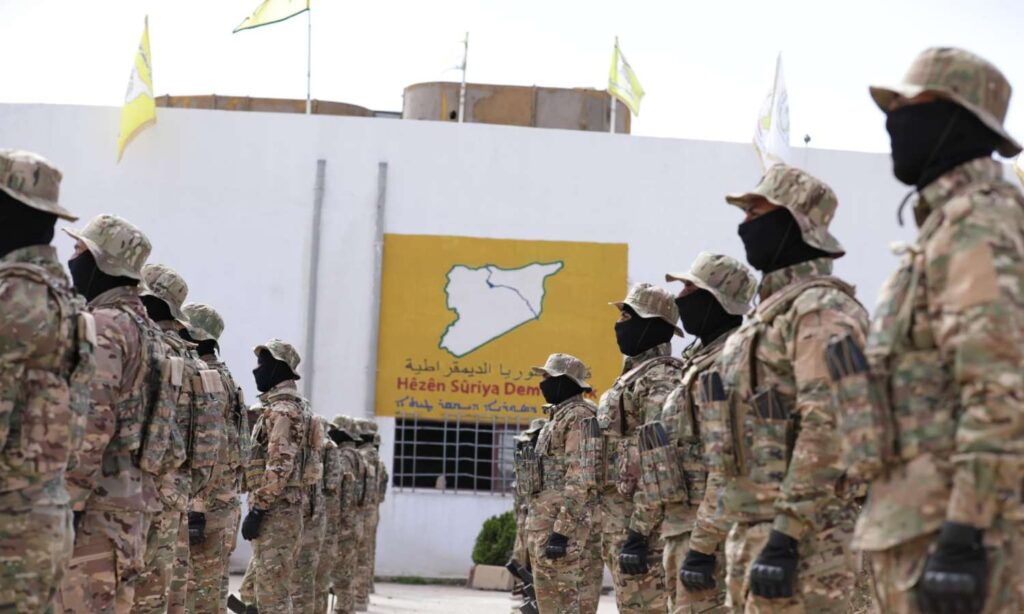The Syrian Democratic Forces (SDF) resumed its compulsory recruitment campaign in al-Hasakah province, four days after issuing a directive that specified those born between 1998 and June 30, 2006, as required for “Self-Defense Duty.”
A correspondent from Enab Baladi in al-Hasakah reported that SDF’s military police patrols have been deployed since Wednesday morning, June 26, along all main roads, specifically the route linking Amuda, Qamishli, al-Qahtaniyah, al-Jawadiyah, and even al-Malikiyah.
The military police set up around ten checkpoints on the road connecting al-Hasakah to its eastern and northern countryside.
Khalil, a bus driver on the Qamishli-al-Malikiyah route in eastern al-Hasakah, told Enab Baladi that cars were queued in “long lines” at each checkpoint under high temperatures, waiting for the military patrols to complete their inspections for those wanted for “Self-Defense Duty.”
He added that usually, the inspection includes checking passengers’ personal IDs before the bus departs from the terminal. The driver is given a signed paper to facilitate passing through the checkpoints without repeatedly checking passengers’ IDs. However, due to the ongoing campaign, all checkpoints are ignoring this paper.
Within Qamishli city and the rest of al-Hasakah’s villages and towns, young men often have to hide while going to work or stay home until the recruitment campaigns end.
Mishal al-Kirt, a 20-year-old working at a falafel restaurant near the Gulf roundabout, where military police presence is heavy, said that he often has to take detours to avoid patrols and may even miss work if the campaign continues, risking his job that supports his father in covering household expenses.
“Repeated recruitment campaigns make employers prefer those exempt from military service over us, threatening our job opportunities,” al-Kirt said.
The Autonomous Administration of North and East Syria (AANES), the political umbrella for the SDF, had canceled on May 8 the campaigns to enlist those obliged for Self-Defense Duty in the areas it controls in northeastern Syria and called for voluntary enlisting.
Bayan al-Ali, the co-chair of the Defense Authority in the Autonomous Administration, said at the time that the decision came in response to residents’ demands, urging those obliged to enlist voluntarily. Returnees residing in northeastern Syria for less than three years and “martyrs’ families” would be released immediately if conscripted for service.
Amendments on “Self-Defense Duty”
Previously, AANES introduced amendments to the “Self-Defense Duty” law in its controlled areas, concerning the postponement of service for doctors and rural workers, alongside other amendments related to fines.
In February, AANES stated that the amendments defined fines for losing the military service document and set an age for study deferment for each educational stage separately. For example, a master’s student can defer service until reaching 32 years old and cannot defer beyond this age even if they have not completed their studies.
A new clause was added to the law, numbered “30,” which stipulated that graduated doctors and pharmacists committed to rural service would have their military service deferred for a whole year, provided the applicant is not older than 30 years. They are entitled to a two-year deferment only.
Compulsory recruitment was implemented by the Kurdish People’s Protection Units (YPG), the core military force of the SDF, following the Dohuk Agreement in 2014, reached after a meeting of Kurdish parties in Dohuk, Iraq, attempting to create an administrative understanding of the area.
Amendments were made to the law in 2018, including deferring university students, the only son in the family based on the mother’s age, and affecting families of the deceased, and those with siblings in the internal security forces (Asayish) and the YPG.
The recruitment law took its final form on June 23, 2019, when the Autonomous Administration approved a new law consisting of 35 articles, making it similar to the compulsory military service law of the Syrian regime, named “Self-Defense Duty.”

